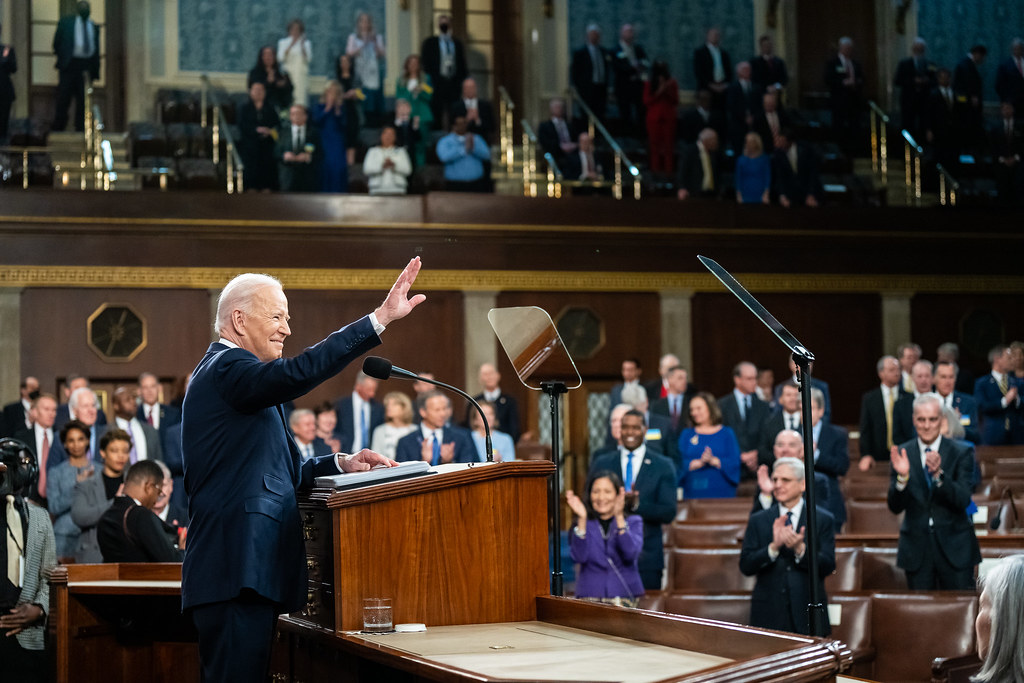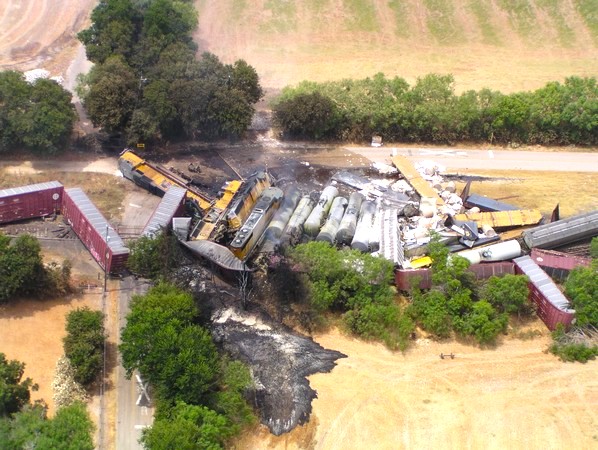The Biden administration and congressional Democrats provided an extraordinary benefit to one of the least deserving industries, writes Phil Mattera.

President Joe Biden during his State of the Union address to a joint session of Congress on March 1, in the House Chamber at the U.S. Capitol in Washington, D.C. (White House/Adam Schultz)
By Phil Mattera
Inequality.org
 The Biden administration and congressional Democrats purport to be pro-union, but in their desperation to prevent a rail strike they fail to understand something fundamental about collective bargaining: Sometimes workers have to inconvenience the public in order to achieve their legitimate goals.
The Biden administration and congressional Democrats purport to be pro-union, but in their desperation to prevent a rail strike they fail to understand something fundamental about collective bargaining: Sometimes workers have to inconvenience the public in order to achieve their legitimate goals.
A strike is a form of disruption. It is designed to put direct economic pressure on an employer by curtailing operations. Yet it also uses indirect means. The hope is that customers, suppliers, creditors and other stakeholders will press management to settle its differences with the union, resulting in better terms for workers.
The louder the public uproar, the more likely there will be concessions by employers.
By trying to prohibit a strike by rail workers dissatisfied with the agreement previously negotiated with the help of the Biden administration, Congress is eliminating both the direct and indirect pressures management might feel to improve on those contract provisions. It is trying to impose a clean solution in a conflict that is inherently messy.

Warren Buffett, whose Berkshire Hathaway conglomerate includes BNSF, in 2013. (Fortune Live Media, Flickr, CC BY-ND 2.0)
At the insistence of progressives, Speaker Nancy Pelosi agreed to an add-on bill that would compel the railroads to provide additional paid sick days — a key point of contention — but that measure failed in the Senate.
Passage of a measure imposing the previous agreement and banning a strike would amount to one of the most egregious cases of strike-breaking by the federal government since Ronald Reagan busted the air traffic controllers union in 1981. It would also constitute an outrageous giveaway to a group of employers with a dismal track record on working conditions and safety.
As documented in Violation Tracker, the five U.S.-owned Class I railroads — BNSF, CSX, Kansas City Southern, Norfolk Southern and Union Pacific — have been fined more than 9,000 times by the Federal Railroad Administration and the Occupational Safety and Health Administration over the past two decades. They have paid over $100 million in penalties. The biggest offender is Union Pacific, with over 3,400 citations and $42 million in fines over safety issues.

Union Pacific’s Harriman dispatching center in Omaha, Nebraska, 2009. (America’s Power, Flickr, CC BY 2.0)
The hazards indicated by these repeated violations — along with the grueling schedules imposed on rail workers — make the demand for ample paid sick leave all the more urgent.
That urgency applies not only to railroad employees but to the public. The safety lapses cited by the Federal Railroad Administration can lead to accidents such as collisions with cars and trucks at grade crossings or derailments in which hazardous materials spill out and endanger nearby communities.
Railroads have a history of trying to suppress information about dangerous working conditions. For example, in 2019 and 2020 BNSF, which is part of Warren Buffett’s Berkshire Hathaway conglomerate, was ordered to pay more than $1.7 million in damages and compensation to an employee who faced retaliation after reporting track defects.
CSX has been fined several times for whistleblower retaliation. For example, in 2021 OSHA found that the company violated the Federal Railroad Safety Act and demonstrated a pattern of retaliation after firing a worker in December 2019 for reporting safety concerns. The agency ordered the company to pay $71,976 in back wages, interest, and damages, and $150,000 in punitive damages.
In 2020 Norfolk Southern was ordered to pay $85,000 and reinstate an employee who was fired for reporting an on-the-job injury. Union Pacific has paid over $700,00 in five retaliation cases.

June 28, 2004: Union Pacific train derailment in Macdona, Texas, a rural community near San Antonio. (Environmental Protection Agency, Public domain, Wikimedia Commons)
The rap sheets of the Class I railroads also include multiple environmental penalties. For example, in 2009 Union Pacific had to pay more than $31 million to settle alleged violations of the Clean Water Act in Nevada. In 2019 it paid $2.3 million to four California counties to resolve allegations relating to the mishandling of hazardous wastes.
In 2010 Norfolk Southern paid over $8 million to the Environmental Protection Agency in connection with a derailment and spill of hazardous chemicals in South Carolina. Three years earlier, it paid over $7 million to Pennsylvania to help pay for the restoration of waterways and wetlands affected by a lye spill.
In 2018 CSX paid $2.7 million to federal and state agencies to resolve liabilities related to water pollution caused by a 2015 derailment and oil spill in West Virginia. In 2004 BNSF paid North Dakota $29 million to resolve litigation relating to a massive underground leak of diesel oil.
The Biden administration and congressional Democrats may not have intended it, but their approach to the rail conflict ended up providing an extraordinary benefit to one of the least deserving industries.
Phil Mattera is the director of the Corporate Research Project and writer for the Dirt Diggers Digest, a weekly blog on corporate misconduct and how to research it. You can follow him on Twitter @DirtDiggers.
This article is from Inequality.org and originally published by Dirt Diggers Digest.
The views expressed are solely those of the author and may or may not reflect those of Consortium News.
Support CN’s
Winter Fund Drive!![]()
Or securely by credit card or check by clicking the red button:


Buffet likely has a Heavenly $PR Bill… given his rep as 1 of the Good Guys.
This commenter agreed ’til BH holdings emerged… publicity ways… as just another Predatory Worker Abuse plantation!
When I was a member of the Brotherhood of Railway Workers in the 1960s, there seemed to be open warfare between management and labor. No one spoke, hostilities all over the place, leaving a new worker like me confused…one could say management was so bad the union had to totally reject it but I didn’t see very much beneficial on either side at the time.
It was not a pleasant place to work and I quit.